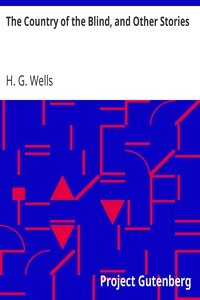The Country of the Blind, and Other Stories, H. G. Wells [top 10 books of all time TXT] 📗

- Author: H. G. Wells
Book online «The Country of the Blind, and Other Stories, H. G. Wells [top 10 books of all time TXT] 📗». Author H. G. Wells
"We passed it talking. I passed it. I can still see the shadow of Gurker's marked profile, his opera hat tilted forward over his prominent nose, the many folds of his neck wrap going before my shadow and Ralphs' as we sauntered past.
"I passed within twenty inches of the door. 'If I say good-night to them, and go in,' I asked myself, 'what will happen?' And I was all a-tingle for that word with Gurker.
"I could not answer that question in the tangle of my other problems. 'They will think me mad,' I thought. 'And suppose I vanish now!—-Amazing disappearance of a prominent politician!' That weighed with me. A thousand inconceivably petty worldlinesses weighed with me in that crisis."
Then he turned on me with a sorrowful smile, and, speaking slowly, "Here I am!" he said.
"Here I am!" he repeated, "and my chance has gone from me. Three times in one year the door has been offered me—the door that goes into peace, into delight, into a beauty beyond dreaming, a kindness no man on earth can know. And I have rejected it, Redmond, and it has gone——"
"How do you know?"
"I know. I know. I am left now to work it out, to stick to the tasks that held me so strongly when my moments came. You say I have success—this vulgar, tawdry, irksome, envied thing. I have it." He had a walnut in his big hand. "If that was my success," he said, and crushed it, and held it out for me to see.
"Let me tell you something, Redmond. This loss is destroying me. For two months, for ten weeks nearly now, I have done no work at all, except the most necessary and urgent duties. My soul is full of inappeasable regrets. At nights—when it is less likely I shall be recognised—I go out. I wander. Yes. I wonder what people would think of that if they knew. A Cabinet Minister, the responsible head of that most vital of all departments, wandering alone—grieving—sometimes near audibly lamenting— for a door, for a garden!"
IV. — I can see now his rather pallid face, and the unfamiliar sombre fire that had come into his eyes. I see him very vividly to-night. I sit recalling his words, his tones, and last evening's Westminster Gazette still lies on my sofa, containing the notice of his death. At lunch to-day the club was busy with his death. We talked of nothing else.
They found his body very early yesterday morning in a deep excavation near East Kensington Station. It is one of two shafts that have been made in connection with an extension of the railway southward. It is protected from the intrusion of the public by a hoarding upon the high road, in which a small doorway has been cut for the convenience of some of the workmen who live in that direction. The doorway was left unfastened through a misunderstanding between two gangers, and through it he made his way...
My mind is darkened with questions and riddles.
It would seem he walked all the way from the House that night—he has frequently walked home during the past Session—and so it is I figure his dark form coming along the late and empty streets, wrapped up, intent. And then did the pale electric lights near the station cheat the rough planking into a semblance of white? Did that fatal unfastened door awaken some memory?
Was there, after all, ever any green door in the wall at all?
I do not know. I have told his story as he told it to me. There are times when I believe that Wallace was no more than the victim of the coincidence between a rare but not unprecedented type of hallucination and a careless trap, but that indeed is not my profoundest belief. You may think me superstitious, if you will, and foolish; but, indeed, I am more than half convinced that he had, in truth, an abnormal gift, and a sense, something—I know not what—-that in the guise of wall and door offered him an outlet, a secret and peculiar passage of escape into another and altogether more beautiful world. At any rate, you will say, it betrayed him in the end. But did it betray him? There you touch the inmost mystery of these dreamers, these men of vision and the imagination. We see our world fair and common, the hoarding and the pit. By our daylight standard he walked out of security into darkness, danger, and death.
But did he see like that?
XXXII. — THE COUNTRY OF THE BLIND.
Three hundred miles and more from Chimborazo, one hundred from the snows of Cotopaxi, in the wildest wastes of Ecuador's Andes, there lies that mysterious mountain valley, cut off from the world of men, the Country of the Blind. Long years ago that valley lay so far open to the world that men might come at last through frightful gorges and over an icy pass into its equable meadows; and thither indeed men came, a family or so of Peruvian half-breeds fleeing from the lust and tyranny of an evil Spanish ruler. Then came the stupendous outbreak of Mindobamba, when it was night in Quito for seventeen days, and the water was boiling at Yaguachi and all the fish floating dying even as far as Guayaquil; everywhere along the Pacific slopes there were land-slips and swift thawings and sudden floods, and one whole side of the old Arauca crest slipped and came down in thunder, and cut off the Country of the Blind for ever from the exploring feet of men. But one of these early settlers had chanced to be on the hither side of the gorges when the world had so terribly shaken itself, and he perforce had to forget his wife and his child and all the friends and possessions he had left up there, and start life over again in the lower world. He started it again but ill, blindness overtook him, and he died of punishment in the mines; but the story he told begot a legend that lingers along the length of the Cordilleras of the Andes to this day.
He told of his reason for venturing back from that fastness, into which he had first been carried lashed to a llama, beside a vast bale of gear, when he was a child. The valley, he said, had in it all that the heart of man could desire—sweet water, pasture, and even climate, slopes of rich brown soil with tangles of a shrub that bore an excellent fruit, and on one side great hanging forests of pine that held the avalanches high. Far overhead, on three sides, vast cliffs of grey-green rock were capped by cliffs of ice; but the glacier stream came not to them but flowed away by the farther slopes, and only now and then huge ice masses fell on the valley side. In this valley it neither rained nor snowed, but the abundant springs gave a rich green pasture, that irrigation would spread over all the valley space. The settlers did well indeed there. Their beasts did well and multiplied, and but one thing marred their happiness. Yet it was enough to mar it greatly. A strange disease had come upon them, and had made all the children born to them there—and indeed, several older children also—blind. It was to seek some charm or antidote against





Comments (0)